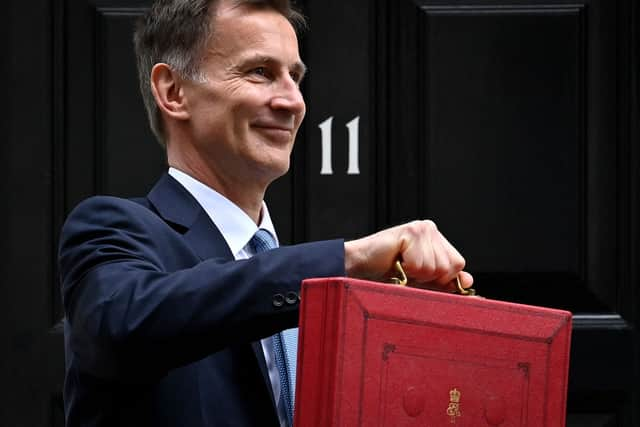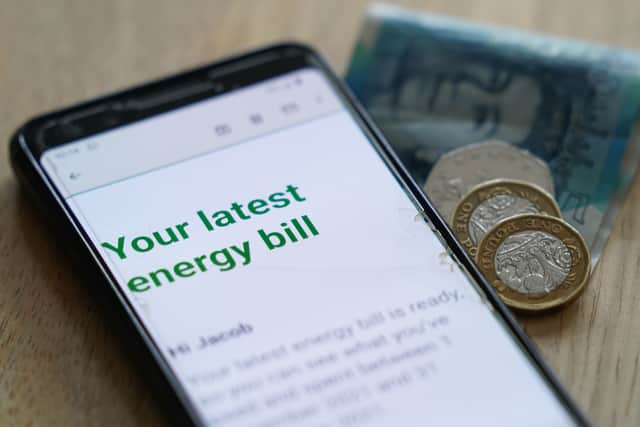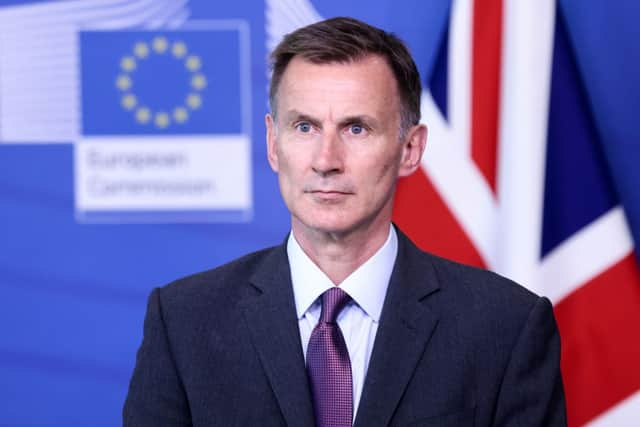When is the Autumn Statement 2023? Date of next Budget event, what Chancellor Jeremy Hunt could say
and live on Freeview channel 276
While it might seem like it was years ago, we are only just approaching the anniversary of Liz Truss and Kwasi Kwarteng’s Mini Budget.
Despite almost 12 months having passed since that now-infamous speech, it has overshadowed almost every policy decision made by Rishi Sunak and the current Chancellor of the Exchequer, Jeremy Hunt. Its swathe of unfunded tax cuts blasted a gaping hole in the public finances, crashed the value of pound, and almost collapsed pension funds and the housing market.
Advertisement
Hide AdAdvertisement
Hide AdThe markets have been very nervous about government policy ever since. As a result, the cost of public borrowing has soared, while homeowners have been hit by higher mortgage rates and renters have faced a surge in their monthly costs. These jitters boiled up again this summer when inflation failed to go down as expected, leading markets to question whether the Sunak administration and Bank of England were up to the task of bringing the rate of price rises down.
Since the Mini Budget, we have had a further two budgetary events. In November 2022, Jeremy Hunt sought to steady the ship with a ‘stability’ speech. And then in the Spring, Hunt gave a speech aimed at growing the economy. The jury is very much still out on whether either aim has yet been achieved - or, indeed, is achievable.
This autumn’s fiscal statement could be the last such event before the next general election, which may now be only months away. But when is the speech going to take place - and what can we expect the Chancellor to announce?
What is a Budget?
Every year, the Chancellor of the Exchequer usually delivers two fiscal speeches - one in the spring and another in the autumn. One of these tends to be a headline Budget, while the other is a more scaled back ‘Statement’ - the designation varies from Chancellor to Chancellor.
Advertisement
Hide AdAdvertisement
Hide AdDuring these speeches, the Chancellor tells MPs - and the general public - about the state of the country’s finances and then reveals the government’s plans for taxation and public spending. As a result, these events usually contain a wide variety of policy announcements and commitments, as well as how they will be paid for. Parliament then gets a chance to vote on the contents of the speech, making them a key vote of confidence in the sitting government.


The Budget or Statement also tends to be accompanied by a report from the Office for Budget Responsibility (OBR) - an independent public body set up by David Cameron’s coalition government. This report examines the financial impact of the Chancellor’s plans. The lack of an OBR report with the Mini Budget was one of the reasons why markets reacted so badly to it.
At the moment, the biggest fiscal event is held in the spring. The autumn speech is currently known as a ‘statement’. But it is still very important, given it tends to contain tax changes that will come in from the next financial year (beginning in April).
When is the Autumn Statement 2023?
The dates of these budgetary events vary from year to year. The autumn speech typically occurs in October or November - taking place after party conference season and the King’s Speech.
Advertisement
Hide AdAdvertisement
Hide AdThis year, party conference season begins on 23 September and runs until 11 October. The King’s Speech - an annual event where the UK monarch reads out the government’s policy priorities for the year ahead - falls on 7 November. Jeremy Hunt has announced the Autumn Statement will take place on 22 November.
What could Jeremy Hunt say in the next Budget?
We usually get to find out about some of the things the Chancellor will announce in their budgetary speech in advance. The run up to the event is also usually a time when the rumour mill goes into overdrive, sometimes as a result of political opponents attempting to bounce the Chancellor into making certain changes.
But the bulk of the announcements tend to be announced on the day itself. The Chancellor also usually saves a ‘rabbit out of the hat’ for the speech - a surprise policy they expect will go down well with voters.


In his past two ‘Budget’ performances in the House of Commons, Jeremy Hunt has not revealed much in advance. The Chancellor has also been light on pleasant surprises. Instead, he has increased the UK’s tax burden to historic highs as a result of his fiscally small and big ‘C’ conservative stance to tackling the budget hole left by Liz Truss and Kwasi Kwarteng.
Advertisement
Hide AdAdvertisement
Hide AdGiven markets remain very jittery about UK inflation, it is unlikely Hunt will make any major spending or tax cutting commitments - even though the right wing of his party has been publicly calling for tax cuts. The Chancellor has already forewarned we may see a “blip” in inflation in September - a statement that is likely to give him a little political leeway, as well as wriggle room with markets, on public borrowing when he delivers his Autumn Statement speech. If the blip is particularly bad, there may be no leeway at all on either front.
In an interview with BBC’s Sunday With Laura Kuenssberg, Hunt suggested falling inflation could do a lot of the leg work for his speech. He said: “If we are going to put money in people’s pockets quickly, the fastest thing I can do is to deliver the Prime Minister’s pledge to halve inflation, because that puts not 1p in the pound, which might be a tax cut, but 5p in the pound in people’s pockets that they wouldn’t have had if inflation stays high.”


However, real-terms incomes have fallen significantly during the cost of living crisis. According to analysis by think tank the Resolution Foundation, workers have seen a 4% reduction in their disposable income since 2021 and are unlikely to see an increase next year. So, although inflationary pressures are now easing and may soon allow wages to make up some of the losses of the last two years, the average person is still going to be worse off for some time yet.
The other big question marks ahead of the Autumn Statement concern winter cost of living payments - particularly given energy bills will be higher than they were last year - and whether the Chancellor will top up departmental budgets to make up for their erosion by inflation. This will be especially key for the Department for Education, which looks set to be landed with a hefty bill as a result of the school concrete crisis.
Advertisement
Hide AdAdvertisement
Hide AdThere may also be important news for pensioners and people on benefits. Hunt is expected to confirm the state pension triple lock will surge in value from next April. But there has been no hint at to whether key benefits, like Universal Credit, will be uprated in line with inflation. Even if they are, the Resolution Foundation says the incomes of the poorest UK households are set to fall by 1% over the next year, with a further 300,000 people dropping into absolute poverty.
Comment Guidelines
National World encourages reader discussion on our stories. User feedback, insights and back-and-forth exchanges add a rich layer of context to reporting. Please review our Community Guidelines before commenting.
